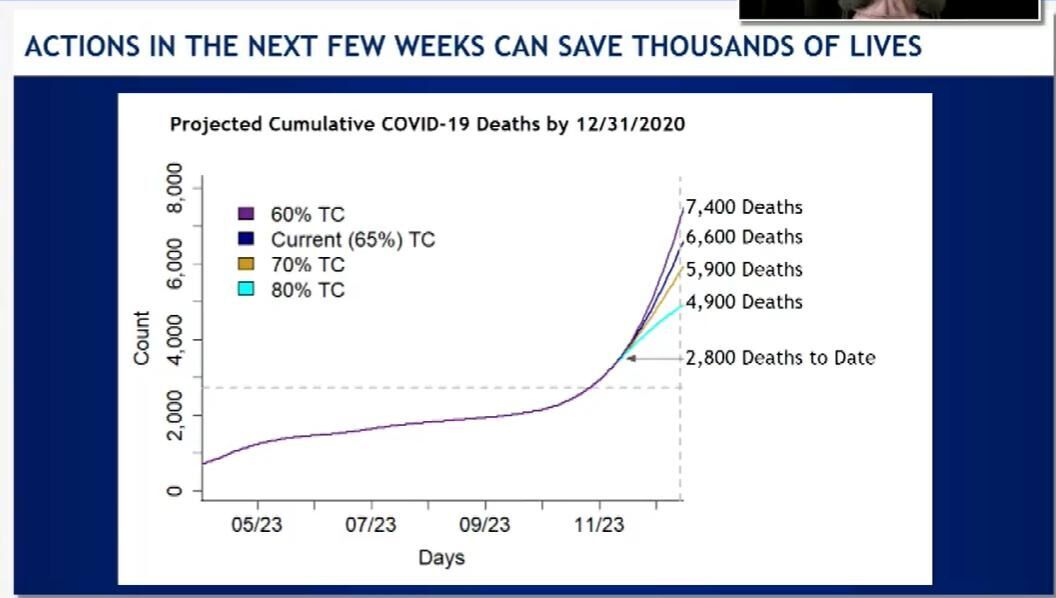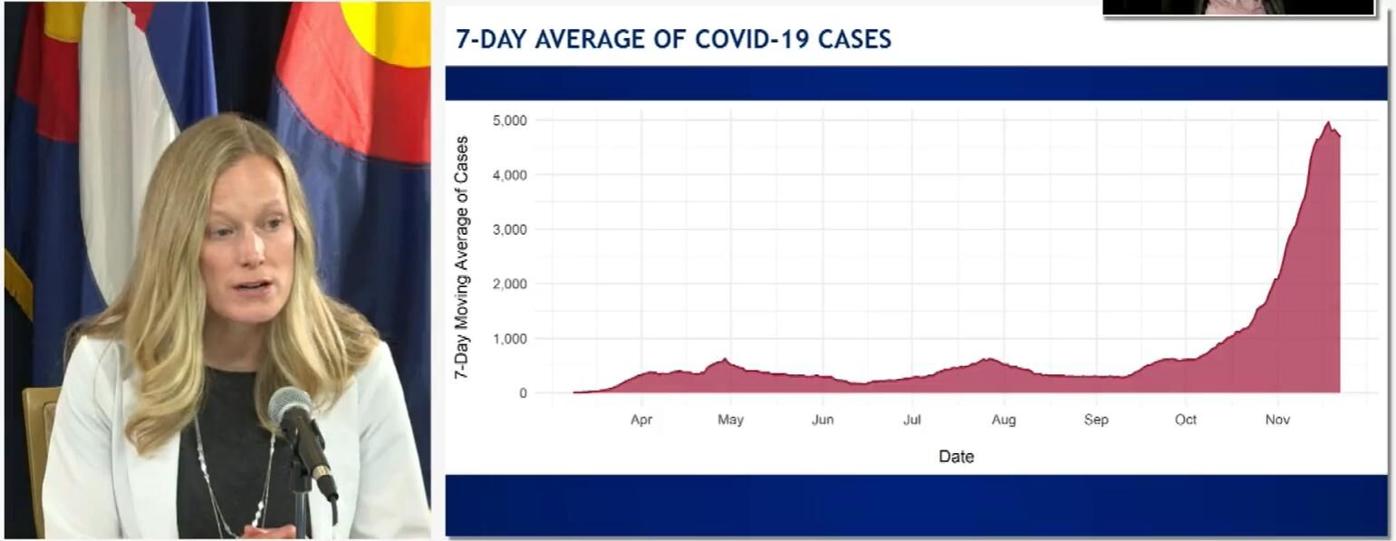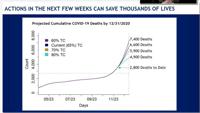Deaths from COVID-19 in Colorado could double in the next five weeks, state officials say
Deaths from COVID-19 between when the pandemic began in March and this week have exceeded 2,800, but state epidemiologist Dr. Rachel Herlihy said during a Tuesday news conference that models show that toll could more than double in the next five weeks, depending on the actions Coloradans take to stem the spread of the virus.
The projected death counts are based on the state’s raging COVID-19 case counts and worse, hospitalizations that are straining hospitals and other health care facilities and staff.

State models showing that deaths from COVID-19 could double by the end of 2020, Nov. 24, 2020.

State models showing that deaths from COVID-19 could double by the end of 2020, Nov. 24, 2020.
It’s not the only issue facing the state. Most of Colorado’s 64 counties are now on the “red” level of the Colorado Department of Public Health and Environment’s dial, indicating those counties are nearing the status that mandates lockdowns. But a handful of counties, mostly controlled by Republican county commissioners, have continued to defy state public health orders.
Gov. Jared Polis had one question for those county commissioners, Weld County being the most notable: “Are you on the side of the virus or on the side of Colorado?”
It’s the news around hospitalizations and ICU bed capacity that is the most worrisome.
Herlihy said the state is at an all-time high for the number of new cases of COVID-19, with 4,150 on Monday. Polis said one in 41 Coloradans is contagious for the virus, down from one in 49 just last week. A Thanksgiving gathering with 10 people could mean there’s a one in four chance someone has COVID. If you decide to host that kind of event, “it’s your own conscience” if someone gets sick, the governor said.
Hospitalizations are also increasing rapidly. Polis said 31 hospitals anticipate staff shortages in the next week, and the number of hospitalizations is double what it was when the pandemic was in its first wave in the spring.

Dr. Rachel Herlihy, the state epidemiologist, shows the seven-day average for COVID-19 cases, Nov. 24, 2020.

Dr. Rachel Herlihy, the state epidemiologist, shows the seven-day average for COVID-19 cases, Nov. 24, 2020.
There are no more ICU beds available in Mesa County, only 25 left in Denver, just three in Weld County, five in Pueblo, 14 in Colorado Springs and none in at least two regions of the state: southwestern Colorado, including Durango; and the San Luis Valley, according to the CDPHE’s website. The state has implemented a data-driven automatic transfer system to ensure that patients diverted from hospitals at capacity can be transferred to hospitals with empty beds.
Herlihy said the state will exceed its total ICU bed capacity by mid-December if the current rate of transmission continues. At even a 5% decrease in transmission, that could extend capacity to mid-January.
Thanksgiving gatherings, as well as Black Friday sales, are clearly on the minds of state officials, who worry that another holiday will result in another surge in the virus. It’s more so for this holiday than it was for Memorial Day, Fourth of July or Labor Day, since those holidays are in the warmer months, and Thanksgiving is an indoor event.
Polis said the way Black Friday sales are normally conducted “is not a smart way” to do it this year. If there’s more than 50 people in a store, “you know someone is contagious,” he said.
For counties and businesses that refuse to obey public health orders, Polis pointed to the state’s ability to yank licenses from restaurants and liquor stores. As to county commissioners, Polis pointed out that restaurants aren’t allowed to have salmonella outbreaks, and “this is no different than it’s ever been regardless of the opinions of county commissioners,” Polis said. “No matter where they live, people want to know they’ll be safe.”
Polis also announced the formation of a task force, to be made up of teachers, parents, school board officials, healthcare workers and others, that will figure out how to get kids back in school in January, with the first meeting to be held Wednesday.
“We can’t let the future of our kids become yet another casualty of this pandemic,” he said.






